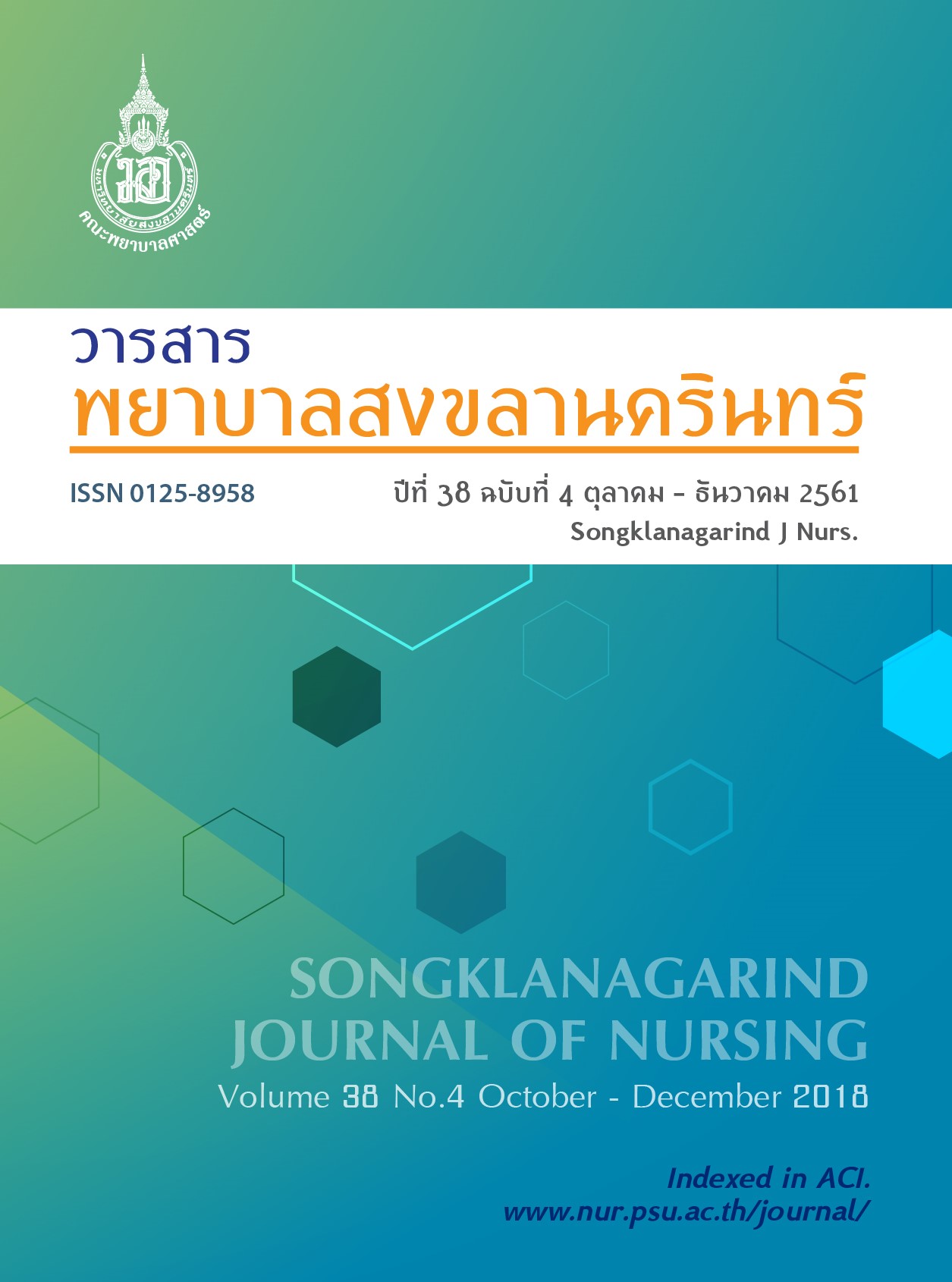Essential and Necessary Information for Self-Care Among Diabetic Patients in the Context of a Primary Care Unit
Main Article Content
Abstract
The purpose of this research was to determine the essential and necessary information for self-care among diabetic patients. This formed part of a study on the development of a personal healthcare monitoring for diabetic patients, developed as an application for smart phones. Qualitative research methodology was employed to conduct the study. Purposive sampling method was used to select the informants in the Northeastern region of Thailand. The study consisted of 65 key informants including diabetic patients, caregivers, staff at the primary care unit, and village health care volunteers. The secondary informant was the village headman.
Data were collected through in-depth interview, observation, focus group discussion and the studying of documents. The results of the study showed that the crucial information consisted of: 1) personal data, 2) health status data, 3) information to promote self-care behaviors among diabetic patients, 4) information for health care service provision, 5) health services information received, 6) information concerning health problems used for informing doctors, and 7) information for the potential development of village health care volunteers. Obviously, these information sets are vital amid the provision of health services for diabetic patients in the area. Consequently, the knowledge obtained from this study may be utilized to develop an application or database for the monitoring of diabetic patients’ health statuses in order to enhance quality of life.
Article Details
References
2. World Health Organization. Diabetes 2017 [internet]. 2017 [cited 2017 July 29]. Available from: http://www.who.int/mediacentre/factsheets/fs312/en/.
3. Aekplakorn W. National Health Examination Survey for Thai Popluation, 5th, B.E. 2557. Nonthaburi: Health Research System Institute; 2014. Thai.
4. Diabetes Association of Thailand, Ministry of Public Health and National Health Security Office. Clinical Practice Guideline for Diabetes, 2014. Bangkok: Aroon Publishing. Thai.
5. National Health Security Office. National Health Security Fund Management Manual, Fiscal Year 2016: Management of the budget for services of control, prevention and treatment of chronic diseases (control, prevention and treatment of patients with diabetes and hypertension). Thana Press. Bangkok, 2015. Thai.
6. Boonsawasdgulchai P, Nuntaboot K, Sangchart B. Data Utilization through Community Participation in Care of Persons with DM. Thai Journal of Nursing Council. 2011; 26(1): 29-40. Thai.
7. Deerochanawong C, Ferrario A. Diabetes management in Thailand: a literature review of the burden, costs, and outcomes. Globalization and Health. 2013; 9:11. Thai.
8. Hangsorn N, Moolsart S, Pichayapinyo P. Effectiveness of a self-management support program for type II diabetes patients with uncontrolled blood sugar. Journal of Nursing and Health Care. 2016; 34(4), 142-151.Thai.
9. Adu MD, Malabu UH, Callander EJ, et al. Considerations for the development of mobile phone apps to support diabetes self-management: Systematic review. JMIR mHealth and uHealth. 2018; 6(6), e10115.
10. Saran T, Pedrycz A, Mucha D. Follow-up monitoring of physical activity after rehabilitation by means of a mobile application: Effectiveness of measurements in different age groups. Advances in clinical and experimental medicine: official organ Wroclaw Medical University. 2018.
11. Fetterman DM. Ethnography: Step by step. Thousand Oaks, CA: Sage; 1989.
12. Oumtanee A. Qualitative research in nursing. Bangkok: Chulalongkorn University Printing House; 2016. Thai.
13. Podhisita C. Science and Art of Qualitative Research. 3rd. Bangkok: Amarin Printing and Publishing Public Company Limited; 2007. Thai.
14. Guba EG. Lincoln YS. Fourth generation evaluation. Newbury Park, CA: Sage; 1989.
15. Miles MB, Huberman MA, Saldana J. Qualitative data analysis a methods sourcebook. 3rd. New Delhi: Sage. 2014.
16. Polit DF, Beck CT. Nursing resaerch: Principles and methods. 7th ed. Philadelphai: Lippincott & Wilkins. 2004
17. Chantavanich S. Qualitative Research Methods. Bangkok: Chulalongkorn University Printing House; 2013. Thai.
18. Jaraeprapal U, Nuntaboot K. Information utilization for care of the elders by the community. Journal of Nursing Science & Health. 2016; 39 (3): 64-74. Thai.
19. Orem DE. Nursing: Concepts of practice. 2nd ed. New York: McGraw–Hill; 1980.
20. Yoschamras S, Nippanon P. The Effects of selfefficacy and goal setting to compare for blood sugar control behaviors of type 2 diabetes patients in Chumphaehospital, Chumphae District, Khon Kean Province. KKU Journal for Public Health Research. 2013; 6(3): 21-30. Thai.


